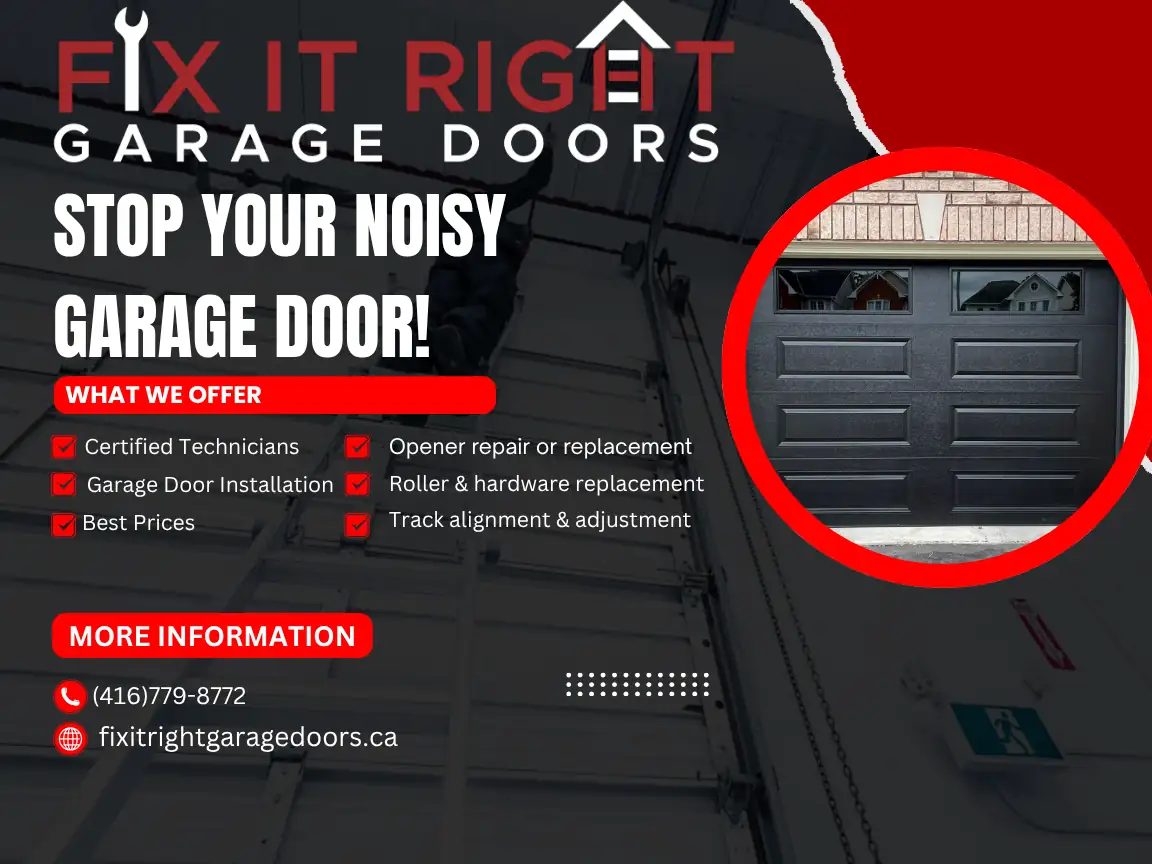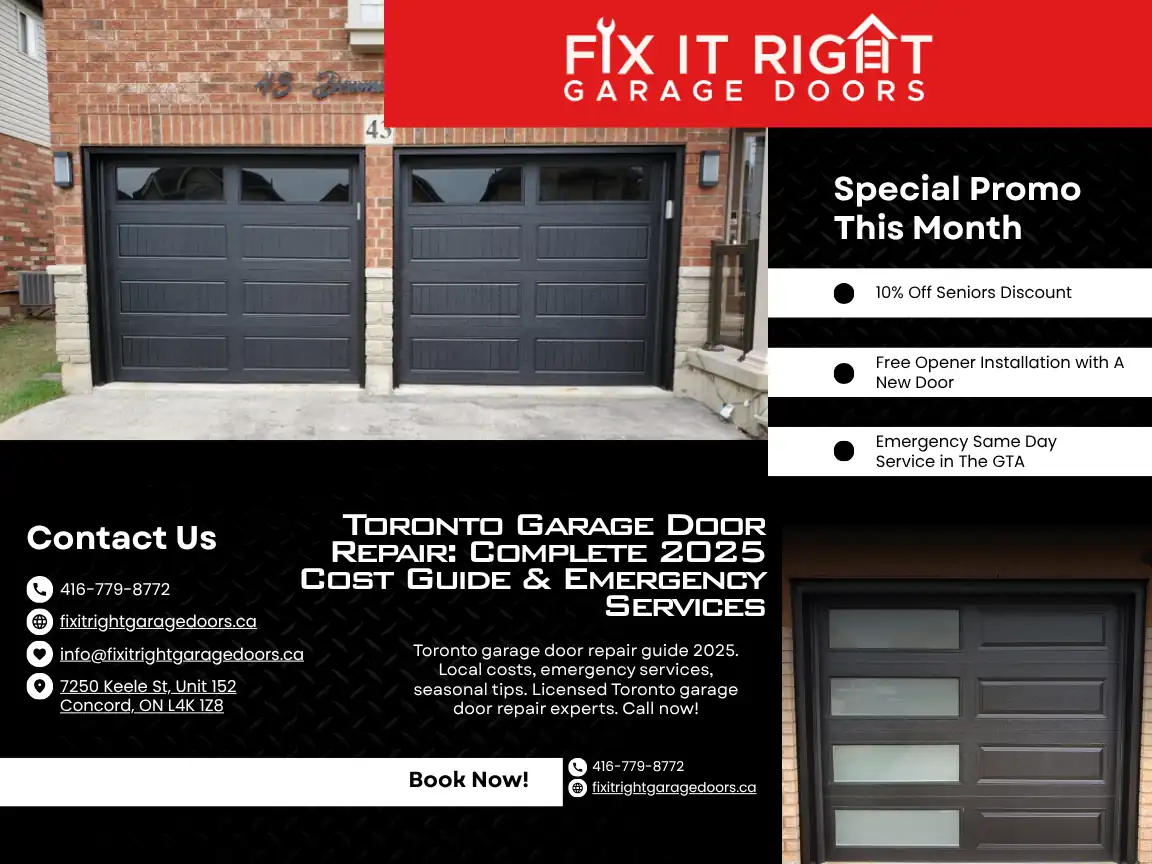A noisy garage door can be more than just an annoyance; it’s often a warning sign that something needs attention. If you’re a GTA homeowner dealing with squeaks, grinding, rattling, or other disturbing sounds every time your garage door opens or closes, you’re not alone. Garage door noise is one of the most common complaints among Canadian homeowners, and fortunately, it’s usually fixable.
According to the International Door Association, most garage door noise issues stem from lack of maintenance, worn components, or improper installation. The good news? Many garage door noise reduction solutions are simple, affordable, and can be accomplished with basic DIY skills. In this comprehensive guide, we’ll explore everything you need to know about diagnosing and fixing your noisy garage door system.
Understanding the source of your loud garage door repair needs starts with identifying the type of noise you’re hearing. Different sounds indicate different problems, from loose hardware to failing rollers or motor issues. Whether you’re experiencing a squeaky garage door fix situation or dealing with more serious garage door rattling noise problems, this guide will help you restore peace and quiet to your home.

noisy garage door

Common Types of Garage Door Noises and Their Causes 🎵
Before attempting any repairs, it’s crucial to identify exactly what type of noise your garage door is making. Each sound tells a different story about what’s happening with your system.
The Sound Guide: What Your Garage Door is Telling You

Understanding these distinctions is the first step in effective noisy garage door diagnosis. Each sound pattern points to specific components that need attention, helping you focus your troubleshooting efforts efficiently.
Why GTA Climate Affects Garage Door Noise
The Greater Toronto Area experiences extreme temperature fluctuations, with winter temperatures dropping well below freezing and summer heat creating expansion challenges. These environmental factors significantly impact garage door performance and noise levels:
- Cold Weather Effects: Metal components contract in freezing temperatures, causing increased friction and garage door rattling noise. Lubricants can thicken or freeze, reducing their effectiveness.
- Temperature Swings: Rapid temperature changes cause materials to expand and contract at different rates, potentially loosening hardware and creating noise.
- Humidity and Moisture: GTA’s humid summers can cause rust formation on metal components, leading to squeaky garage door fix needs and grinding sounds.
- Ice Buildup: Winter ice accumulation on tracks, rollers, and sensors can cause operational noise and strain on the door system.
According to This Old House, regular seasonal maintenance becomes even more critical in climates with significant temperature variations like the GTA experiences.
Step-by-Step Solutions for a Noisy Garage Door 🔧
Solution 1: Comprehensive Lubrication
Proper lubrication is the single most effective garage door noise reduction strategy. Many homeowners overlook this simple maintenance task, yet it can eliminate up to 80% of common garage door noises.
What You’ll Need:
- White lithium grease or silicone-based garage door lubricant
- Clean rags or paper towels
- Step ladder
- Safety glasses
Lubrication Process:
- Prepare the Door: Close the door completely and disconnect the opener by pulling the manual release handle. This ensures safety during maintenance.
- Clean Before Lubricating: Use a clean rag to wipe away old lubricant, dirt, and debris from all moving parts. Applying new lubricant over dirty surfaces won’t solve your noisy garage door problems effectively.
- Lubricate Hinges: Apply lubricant to each hinge where the pin enters the hinge body. Open and close the door manually a few times to work the lubricant in. You should have multiple hinges along each side of sectional doors; don’t miss any.
- Treat Rollers: Apply lubricant to the roller bearings (not the tracks). If you have nylon rollers, lubricate only the steel bearings at the center. Metal rollers need lubrication on both the roller surface and bearings.
- Lubricate Springs: Apply lubricant along the entire length of torsion springs above the door. This prevents rust, reduces friction, and extends spring life. Work the door up and down a few times to distribute the lubricant.
- Address the Tracks: While you don’t need to lubricate the entire track surface, apply a thin coat to the curved sections where the door transitions from vertical to horizontal. This is where most friction occurs.
- Chain or Belt Drive: For chain drive openers, apply white lithium grease along the chain length. Belt drives generally don’t require lubrication but check manufacturer recommendations.
Lubrication Tips:
- Avoid WD-40 or other penetrating oils as primary lubricants; they’re solvents, not long-term lubricants
- Use silicone-based or lithium-based products specifically designed for garage doors
- Lubricate every 3-6 months in the GTA to account for weather extremes
- Always wipe away excess lubricant to prevent dirt accumulation
Solution 2: Tighten Loose Hardware
A loud garage door repair often requires nothing more than tightening loose bolts, nuts, and screws. Regular door operation creates vibration that gradually loosens hardware over time.
Hardware Inspection Checklist:
- Track Brackets: Check bolts securing the track to the wall or ceiling. Loose tracks can shift and cause garage door rattling noise during operation.
- Hinge Hardware: Examine all hinge bolts and screws. Loose hinges create noise and can cause premature wear on other components.
- Roller Brackets: Ensure brackets holding rollers are secure. Loose roller brackets allow excessive movement and noise.
- Opener Mounting: Check bolts securing the opener to the ceiling or header. A loose opener transmits vibration noise throughout your garage.
- Chain or Belt Tension: Ensure the drive mechanism has proper tension; not too tight, not too loose. Manufacturers typically recommend 1/4 to 1/2 inch of play in the chain or belt.
Tightening Process:
- Use a socket wrench or adjustable wrench for better torque than screwdrivers alone
- Tighten firmly, but don’t over-torque; you can strip threads or crack components
- Replace any damaged or stripped hardware immediately
- Consider using lock washers or thread-locking compound on frequently loosened bolts
The Family Handyman recommends inspecting and tightening garage door hardware every six months as part of routine maintenance.
Solution 3: Replace Worn Rollers
Rollers are among the most common culprits in noisy garage door scenarios. Most residential garage doors have 8-12 rollers that guide the door along the tracks. When these wear out, they create significant noise.
Signs You Need New Rollers:
- Visible cracks or chips in nylon rollers
- Worn or loose bearings in metal rollers
- Flat spots on the roller surface
- Excessive wobbling when the door operates
- Grinding sounds that don’t improve with lubrication
Roller Types and Noise Levels:
Metal rollers are louder but last longer (10-15 years), while nylon rollers are quieter but have shorter lifespans (5-10 years). For optimal garage door noise reduction, nylon rollers with sealed bearings offer the best combination of quiet operation and durability.
Roller Replacement Process:
- Safety First: Never remove rollers on the bottom bracket; these are under tension from the spring system and can cause serious injury.
- Remove Old Rollers: Loosen the hinge bolts holding the roller bracket, slide out the old roller, and remove it from the hinge.
- Install New Rollers: Insert the new roller stem into the hinge, slide the roller into the track, and reattach the hinge to the door.
- Work Systematically: Replace one roller at a time, working from top to bottom on each side.
- Test Operation: After replacing all rollers, manually operate the door several times to ensure smooth, quiet operation.
Professional roller replacement typically costs $150-$300 for a full set including labor, while DIY replacement costs $60-$100 for quality nylon rollers.
Solution 4: Repair or Replace Worn Springs
Springs are critical components that counterbalance your garage door’s weight. When they begin to fail, they can create significant noise and pose safety risks.
Spring-Related Noise Indicators:
- Loud popping or snapping sounds
- Squeaking from the spring coils
- Visible gaps between spring coils
- Difficulty opening or closing the door smoothly
Important Safety Warning: Torsion spring replacement is dangerous and should only be performed by trained professionals. These springs are under extreme tension (150-300 pounds) and can cause severe injuries if they release unexpectedly. Extension springs are somewhat safer but still require caution.
Professional Spring Service: While you can lubricate springs yourself, replacement requires professional service. A qualified technician has the proper tools and training to safely remove and install springs. The cost typically ranges from $150-$350 depending on spring type and size.
Solution 5: Address Track Issues
Misaligned or damaged tracks contribute significantly to loud garage door repair needs. The tracks guide your door’s movement, and any imperfection creates noise and operational problems.
Track Inspection Points:
- Check for dents, bends, or obstructions in the track
- Verify tracks are level and properly aligned
- Ensure proper spacing between the door and track (approximately 1/4 inch)
- Look for rust or corrosion that could impede smooth roller movement
Minor Track Adjustments: Small alignment issues can sometimes be corrected by loosening track mounting brackets, gently tapping the track into proper position, and retightening the bolts. However, significant track damage usually requires professional replacement.
Track Maintenance: Keep tracks clean by wiping them down seasonally with a damp cloth. Remove any debris, spider webs, or accumulated dirt that could interfere with roller movement and cause noise.
Advanced Noise Reduction Strategies 🛠️
Upgrade Your Garage Door Opener
Older chain-drive garage door openers are notorious for being loud. If your opener is more than 15 years old and contributing to your noisy garage door problem, upgrading might be your best solution.
Opener Types Ranked by Noise Level:
- Direct Drive Openers (Quietest): The motor itself moves along the rail, with minimal moving parts
- Belt Drive Openers (Very Quiet): Rubber belt creates almost silent operation
- Screw Drive Openers (Moderate): Metal threaded rod creates moderate noise
- Chain Drive Openers (Loudest): Metal chain creates significant operational noise
Modern openers also include improved mounting systems, better motors with soft-start/soft-stop features, and vibration-dampening technology. These features provide significant garage door noise reduction benefits beyond just the drive mechanism type.
According to Consumer Reports, upgrading from a chain drive to a belt drive opener can reduce operational noise by 60-70%, making it a worthwhile investment for homeowners with bedrooms adjacent to or above the garage.
Install Vibration Isolators
Much of the noise from a noisy garage door isn’t from the door itself but from vibration transmitted through the mounting structure. Vibration isolators significantly reduce noise transmission.
Types of Vibration Isolators:
- Rubber Isolation Pads: Place these between the opener and ceiling mounting points
- Anti-Vibration Kit: Complete systems including flexible mounting brackets
- Sound Dampening Panels: Install on walls adjacent to living spaces
- Soft Start/Stop Technology: Modern openers with gradual acceleration reduce vibration
These solutions are particularly important for GTA homeowners with living spaces above or adjacent to the garage. Installation is straightforward and typically costs $30-$100 for materials.
Insulate Your Garage Door
Insulated garage doors operate more quietly than non-insulated doors. The insulation layer dampens vibration and reduces noise transmission significantly.
Insulation Benefits:
- Reduces operational noise by 20-30%
- Improves energy efficiency
- Adds rigidity to door panels, reducing garage door rattling noise
- Provides temperature control benefits for GTA’s extreme climate
You can retrofit insulation to existing doors or upgrade to a new insulated door. Retrofit kits cost $200-$400, while new insulated doors range from $800-$3,000 depending on size and insulation value.
Seasonal Maintenance for Quieter Operation 🍁
Spring Maintenance Checklist
After harsh GTA winters, spring maintenance is crucial for preventing squeaky garage door fix issues:
- Clean Thoroughly: Remove salt, sand, and winter debris from all components
- Inspect for Damage: Check for rust, corrosion, or weather damage
- Lubricate Generously: Replace lubricants that may have degraded over winter
- Test Safety Features: Ensure sensors and auto-reverse functions work properly
- Tighten Hardware: Address any loosening that occurred during winter operation
Fall Winterization
Preparing your garage door for GTA winters prevents many noise problems:
- Apply Fresh Lubricant: Use cold-weather-rated lubricants that won’t freeze
- Check Weather Stripping: Replace worn seals to prevent ice buildup
- Adjust Track Alignment: Ensure proper alignment before temperature drops
- Test in Cold Conditions: Verify smooth operation during the coldest morning
- Clean Tracks: Remove any debris before winter moisture creates problems
Regular seasonal maintenance reduces the likelihood of developing loud garage door repair needs and extends component lifespan significantly.
When to Call a Professional 📞
While many garage door noise reduction tasks are DIY-friendly, some situations require professional expertise:
Professional Service Indicators
Immediate Professional Attention Needed:
- Broken spring (loud snap sound and door won’t stay open)
- Severe track damage or misalignment
- Motor problems or opener failure
- Cable damage or fraying
- Door binding or extreme resistance during operation
Consider Professional Assessment:
- Persistent noise after DIY troubleshooting
- Uncertainty about the noise source
- Complex roller or spring replacement
- Need for major component upgrades
- Safety sensor or electronics issues
Professional technicians have specialized tools for spring replacement, track alignment, and precise adjustments that ensure optimal, quiet operation. They can also identify potential problems before they become expensive emergency repairs.
Cost Guide: Fixing a Noisy Garage Door 💰
Understanding potential costs helps you budget for noisy garage door repairs:

Most homeowners find that regular maintenance costs $100-$150 annually (including professional inspection) but prevents expensive emergency repairs averaging $500-$1,000.
Preventive Measures for Long-Term Quiet Operation 🛡️
Establish a Maintenance Schedule
Consistency is key for preventing squeaky garage door fix situations:
Monthly:
- Visual inspection for obvious problems
- Quick cleaning of visible debris
- Test safety features
Quarterly:
- Comprehensive lubrication
- Hardware tightening
- Track cleaning
Annually:
- Professional inspection
- Complete system evaluation
- Spring and cable assessment
- Opener diagnostics
Quality Components Matter
Investing in quality parts during repairs or replacements reduces future noise problems:
- Choose nylon rollers with sealed bearings over cheap metal alternatives
- Select name-brand springs with proper ratings for your door weight
- Invest in quality lubricants formulated for garage door systems
- Consider premium openers with noise-reduction features
Quality components cost 20-40% more initially but typically last 2-3 times longer and operate more quietly throughout their lifespan.
Maintain Proper Balance
A properly balanced garage door operates quietly and extends opener life. Test balance by disconnecting the opener and manually lifting the door halfway—it should stay in place without assistance. If it drops or rises, the spring tension needs professional adjustment.
Poor balance causes excessive strain on the opener, accelerates wear on all components, and creates noise during operation. Professional balance adjustment typically costs $75-$150 and should be performed when you notice imbalance symptoms.
Environmental Considerations 🌍
Many traditional garage door lubricants contain petroleum-based ingredients that can harm the environment. Consider these eco-friendly alternatives:
- Biodegradable lubricants: Plant-based formulations that perform well without environmental impact
- Silicone-based products: Generally more environmentally friendly than petroleum alternatives
- Proper disposal: Never pour excess lubricant down drains; dispose of at hazardous waste facilities
The Canadian Environmental Protection Act encourages using eco-friendly maintenance products whenever possible, and several manufacturers now offer effective green alternatives specifically for garage door systems.
Conclusion: Enjoy Your Quieter Garage Door ✅
A noisy garage door doesn’t have to disrupt your household peace. Most noise problems stem from simple maintenance issues—lack of lubrication, loose hardware, or worn components—that are easily addressed with the right approach.
By following the systematic troubleshooting steps outlined in this guide, most GTA homeowners can achieve significant garage door noise reduction through DIY maintenance. Regular lubrication, hardware tightening, and component replacement when necessary keep your garage door operating smoothly and quietly for years.
Remember that preventive maintenance is far more cost-effective than emergency repairs. A modest investment of time and money in regular maintenance prevents most loud garage door repair situations and extends the lifespan of your entire garage door system.
Whether you’re dealing with a squeaky garage door fix need, addressing garage door rattling noise problems, or simply wanting to improve your door’s performance, the solutions in this guide provide a comprehensive approach to achieving and maintaining quiet, reliable garage door operation.
For complex issues, persistent problems after DIY troubleshooting, or situations requiring specialized tools and expertise, don’t hesitate to seek professional assistance. The peace and quiet of a properly functioning garage door is worth the investment.
🔧 Need Expert Help with Your Noisy Garage Door?
If you’re experiencing ongoing noise problems, need professional diagnosis, or want comprehensive noise reduction service, please give Fix it right garage doors a call for further information or to book with us. Our experienced technicians serve the entire GTA and can quickly diagnose and resolve any garage door noise issue, ensuring your home remains peaceful and your door operates reliably.









